January 5, 2018
Edited by David Sanders
Specimen Days
1463—French poet Francois Villon banished from Paris.
1465—Charles, Duke of Orléans, French poet (b. 1394), dies.
1524—Marko Marulic/Marulus/Splichanin/
1806—Andre H C van Hasselt, Belgian poet (La Belgium), is born.
1848—Khristo Botev, hero of Bulgarian revolt against Turkey, poet, is born.
1883—Charles Tompson, first Australian published poet (b. 1806), dies.
1885—Humbert Wolfe, Italian-British poet (d. 1940), is born.
1900—Paula Ludwig, Austrian German poet, born in Vorarlberg, Austria (d. 1974), is born.
1926—William De Witt Snodgrass, American poet, is born.
1940—Humbert Wolfe, Italian-British poet (b. 1885), dies.
1991—Vasko Popa, Serbian WW II-partisan/poet (Sporedno Nebo), dies at 68.
1995—Somerset de Chair, British writer, politician and poet, dies at 83.
2007—Chih Ree Sun, Chinese-American physicist and poet (b. 1923), dies.
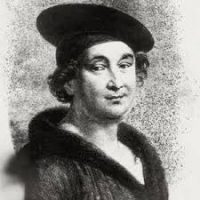
You see us hang here, half a dozen who
Indulged the flesh in every liberty
Till it was pecked and rotted, as you see,
And these our bones to dust and ashes fall.
Let no one mock our sorry company,
But pray to God that He forgive us all.
—from “Ballade of the Hanged Men” by François Villon
[translated by Richard Wilbur]
“You see us hang here, half a dozen who / Indulged the flesh in every liberty / Till it was pecked and rotted” – François Villon
World Poetry
Paul Muldoon Wins Queen's Gold Medal for Poetry 2017
Paul Muldoon has been named the winner of the Queen’s gold medal for poetry 2017. The Northern Ireland-born writer has produced 12 major collections of poetry as well as children’s books and song lyrics. The poet Laureate, Dame Carol Ann Duffy, said: “Paul Muldoon is widely acclaimed as the most original and influential poet of the past 50 years and is rightly celebrated alongside Seamus Heaney.
Yu Guangzhong, Exiled Poet Who Longed for China, Dies at 89
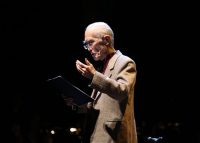
Yu Guangzhong, a prominent poet, essayist and translator whose best-known work, “Nostalgia,” came to symbolize the aching separation, displacement and longing for cultural unity felt by many in mainland China and in the Chinese diaspora, died on Dec. 14 in Kaohsiung, Taiwan. He was 89. A statement by Kaohsiung Medical University Chung-Ho Memorial Hospital, where he died, said the cause was respiratory failure.
Better Late than Never: Rome Revokes the Exile of the Poet Ovid, 2,000 Years after his Death
Two thousand years after he was banished to the outer edges of the empire, the city of Rome has formally revoked the exile of the poet Ovid. A prolific writer famous for his Metamorphoses and The Art of Love, Ovid was exiled by the Emperor Augustus to a remote town on the coast of the Black Sea, in what is today Romania, in 8 AD. He remained there until his death, never seeing Italy again.
'I live like a plant': Nobel Winner's Wife 'going mad' under Chinese Detention
Liu Xia, poet and widow of democracy advocate Liu Xiaobo, suffering deep depression

Friends of the late Chinese democracy advocate and Nobel laureate Liu Xiaobo have voiced concern about his widow’s health after she sent a letter showing signs of deep depression. The poet Liu Xia, 56, has been under police watch without charges since her husband was awarded the Nobel peace prize in 2010, a recognition that deeply angered the Communist regime. In a letter written in the form of a poem to the 2009 Nobel laureate for literature, Herta Mueller, Liu said she was “going mad”.
Yu Guangzhong, a prominent poet, essayist and translator, died on Dec. 14 in Kaohsiung, Taiwan. He was 89.
Recent Reviews
Kaveh Akbar, Calling A Wolf A Wolf
by John Ebersole
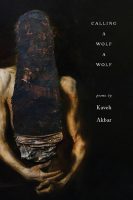
If you decide to read Calling a Wolf a Wolf, Kaveh Akbar's new book of poems, you'd be wise to look up from time to time to remember there's more to life than Kaveh Akbar. (The pronoun I appears about 440 times.) Dumbfoundedly imaginative and self-absorbed, his poetry engulfs the reader with so much turbulent rhetoric you're surprised he's capable of writing a poem as unwavering as "Learning to Pray".
Willing to Be Reckless
Marianne Moore’s New Collected Poems, edited by Heather Cass White.
by Ange Mlinko
It was Robert Frost who said, in a letter, “in verse as in trapeze performance is all.” Is it any surprise then to read of Marianne Moore that she kept a trapeze in her house — “mystifying visitors,” writes her biographer, Linda Leavell? Moore was a consummate performer in her work (the biography is even called Holding on Upside Down), and she admired athletes in particular, having famously pitched the first ball of the season at Yankee Stadium in 1968, and having written the liner notes for I Am the Greatest! by Cassius Clay (aka Muhammad Ali). Among the best pieces of prose she wrote was an essay on Anna Pavlova, not because she was a balletomane, but because something about the dancer’s “persuasion of contrasts” spoke to her own sense of artistry: “undogmatic decisiveness, strength of foot with lightness of body; technical proficiency with poetic feeling; aloofness and simplicity in one who had chosen as her art that most exposed form of self-expression, dancing.”
Second Acts: A Second Look at Second Books of Poetry: Susan Stewart and Jennifer Chang
by Lisa Russ Spaar
One singular pleasure of this “Second Acts” column — which examines, à deux, second books of poems, one of which had appeared 20 or more years ago and the other only recently — is the chance to discover mutual sympathies between two poets and their projects, both aesthetically and in terms of subject matter. These connections may be conscious — what Goethe called “elective affinities” — or they may be unconscious. Either way, reading the texts in counterpoint can prove illuminating, even surprising. Susan Stewart and Jennifer Chang seem like an obvious pairing; the two certainly share some scholarly and poetic DNA. Both are intrepid, lucid literary critics and poets of visceral intellection. Stewart, currently Avalon Foundation University Professor in the Humanities and professor of English at Princeton University, is such a dazzling academic (a MacArthur Fellow who has also served as a chancellor of the Academy of American Poets, she will deliver the prestigious Clarendon Lectures at Oxford University in 2020) that it might be understandable if her critical work overshadowed her poems.
Kaveh Akbar’s “Calling A Wolfe A Wolf” was reviewed in Tourniquet Review.
Broadsides
Why Rupi Kaur and Her Peers Are the Most Popular Poets in the World
by Carl Wilson
John Ashbery’s death in September gave my world a lurch, as the 90-year-old eminent American experimentalist was my favorite living poet. But the compensation was to discover how many others felt the same way. The appreciations became a rare public conversation about poems rather than about Poetry, and what it is or isn’t (as in last year’s exhausting brouhaha over Bob Dylan’s Nobel Prize) or whether it’s “dead,” or corrupted by elitist obscurism, or replaced by popular music, or secretly thriving. On social media, people posted their favorite Ashbery poems and passages, like this one from 1977’s “The Other Tradition,” which might seem to refer to those cyclical debates: “They all came, some wore sentiments / Emblazoned on T-shirts, proclaiming the lateness / Of the hour … ” It was sweet while it lasted.
Meeting Point: On Being a Chinese Poet Writing in English
by Mary Jean Chan

Born and raised in Hong Kong (until I left for university in the US at the age of 19), I understood myself to be a Chinese person living in a British colony. The decolonization of Hong Kong occurred when I was seven-years-old. In 1997, Hong Kong was officially handed back to China under the Sino-British Joint Declaration, negotiated in the early 1980s by Deng Xiaoping and Margaret Thatcher. I knew what it meant to love the aggressor – to adore all things British – despite knowing that my home city was the price China paid for British aggression in the aftermath of the First and Second Opium Wars, during which the Treaty of Nanking (1842), the Convention of Peking (1860) and the Convention for the Extension of Hong Kong Territory (1898) were signed respectively, which meant that Hong Kong Island and Kowloon were given to the UK in perpetuity, while the New Territories was ceded to Britain 99-year lease.[1]
Mary Jean Chan reflects on being a Chinese poet writing in English at Wild Court.
Drafts & Fragments
The Robots Are Here to Write Poetry
But how are we going to teach them to do it well if no one can agree on what makes good verse?
by Jessica Leigh Hester
For almost 200 years. humans have been outsourcing the task of writing poetry—fitting fragments of the human experience into a mosaic of thrill and despair—to machines. In addition to hammering our thoughts out on keyboards, we’ve also relinquished some of the creative process. Even though a rickety automaton or a motherboard can’t mope about love gone wrong or recall the warmth of gauzy afternoon light, they can stumble across some pretty convincing metaphors—and they’re becoming decent mimics.
2017: A Stellar Year for New Poetry
by John McAuliffe
When WB Yeats’s desk sold for a huge sum, in London, to an Irish buyer, in September, it was a reminder of poetry's unusual but ultramodern economy, where archives and icons, a sort of spin-off line in merchandising, can command as much if not more interest than the poems. But, fascinating as it was to pore over the bits and bobs of the Yeats auction catalogues, there were more consequential events in 2017, which was a stellar year for new poetry.
For almost 200 years. humans have been outsourcing the task of writing poetry—creating fragments of the human experience—to machines.
Poetry In the News
Nashville's New Poet Laureate Can Make A Crowd Gasp
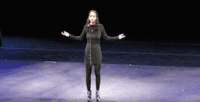
Harpeth Hall sophomore Haviland Whiting is Nashville’s new youth poet laureate after winning the annual spoken word competition hosted by Southern Word and several Metro agencies, including Mayor Megan Barry's office. Whiting’s winning performance opened and closed with her singing — and in the middle, she decried abuses against black women.
Dick Allen, A Connecticut Poet Laureate, Dies At 78
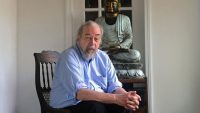
Dick Allen of Trumbull, a poet, essayist and educator who was poet laureate of Connecticut from 2010 to 2015, died Tuesday after suffering a heart attack on Christmas, his daughter announced on Facebook. He was 78. He died at around 3:30 p.m. at St. Vincent’s Medical Center in Bridgeport, Tanya Allen said.
Longtime Editor of American Poetry Review, 'the Poetry Don' Dies at 68

David Bonanno, 68, longtime editor of the nationally renowned and Philadelphia-based American Poetry Review, died Friday, Dec. 8, from complications after a medical procedure. In a field that his friend and New Jersey’s first poet laureate, Gerald Stern, described as full of “envy and backbiting,” Mr. Bonanno was a kindhearted and understated presence who was generous with his time and expertise.
New Books
After the Afterlife by T.R. Hummer
[Paperback] Acre Books, 72 pp., $16.00

After the Afterlife explores the zone between language and spirit. It is a book of inner and outer boundaries: of blockades, of tunnels, of wormholes. Where does our consciousness come from, and where is it going, if anywhere? With a nimble blend of wit, whimsy, and erudition, Hummer's poems assay the border that the shaman is forced to cross to wrestle with the gods, which is the same border the mystic yearns to broach, and the ordinary human stumbles over while doing laundry or making lunch—where questions of identity melt in the white heat of Being.
The Bees by Carol Ann Duffy
[Paperback] Pan Macmillan, 96 pp., $13.95
Here Carol Ann Duffy uses her full poetic range: there are drinking songs, love poems, poems of political anger; there are elegies, too, for beloved friends, and—most movingly—the poet’s own mother. Woven and weaving through the book is its presiding spirit: the bee. Sometimes the bee is Duffy’s subject, sometimes it strays into the poem, or hovers at its edge. In the end, Duffy’s point is clear: the bee symbolizes what we have left of grace in the world, and what is most precious and necessary for us to protect. The Bees, at once intimate and public, is a work of great power from one of our most cherished poets.
The Cataracts by Raymond McDaniel
[Paperback] Coffee House Press, 144 pp., $16.95

“Raymond McDaniel has always been the most brilliant of poets―razor sharp in intellect, take-no-prisoners in form. What is new in The Cataracts is a broader, more hospitable ease with the legible forms of feeling, with even―remarkable!―the partial lineaments of narrative. Make no mistake: this is narrative-with-leverage; the poet’s dazzling mind-play is perfectly intact. Among the other gifts these poems have to offer is a penetrating inquiry into the physics, the metaphysics, and the brutal socioeconomics of sight. From its ravishing title poem to its most excoriating political critiques, this is a book for which I am profoundly grateful.” ―Linda Gregerson
There's a Hum by Jeanne-Marie Osterman
[Paperback] Finishing Line Press, 40 pp., $14.99
Jeanne-Marie Osterman’s poetry is the poetry of the people. The poems in this collection, There’s A Hum, have people in them that talk, that love, that get sick; people that have stuff, and buy things, and drive, and accidentally cut tails off of a dog, that buy buses in Corpus Christi, that think about race and whiteness, and money, and poetry. Every poem in this book is a story. Every poem in this book embraces the reader, fully. These are beautiful poems because they make sense and they carry on through till the next day. That is, you will remember them after you have read them. You might have read “Assisted Living,” with all of its big heart, or, “For I Will Sing of Telephone Wires,” with all of its lyrical repetition, on a Tuesday, and on a Thursday, looking out a window, they will come back to you, land on your shoulder, a bird, a cockatiel, and will sing a song and you will find yourself singing along with it, humming.— Matthew Lippman
Luxury: Poems by Philip Schultz
[Hardcover] W. W. Norton & Company, 96 pp.$26.95

In this compassionate new collection, Philip Schultz’s wry and incisive poetic voice takes on both the eternal questions of meaning and happiness and essentially modern complexities―the collective power of women’s marches, the strangeness of googling oneself, the refugee crisis, the emotions associated with visiting the 9/11 memorial. At once philosophical and droll, Schultz explores life’s luxuries and challenges with masterly precision.
Raymond McDaniel has always been the most brilliant of poets―razor sharp in intellect, take-no-prisoners in form.
Correspondences
The Anne Carson Interview
by Melissa Beck

The ancient Greek god Apollo, in addition to being associated with the sun, healing, and music, communicated Zeus’s will through a series of arcane messages at his prophetic shrine in Delphi. Between the seventh and fifth centuries b.c.e., a Greek could visit the Temple of Apollo and participate in the elaborate process involved to pose a personal, religious, or political question or problem to the Pythia, commonly known as the Oracle at Delphi, the priestess of Apollo who delivered the God’s cryptic messages. Her ambiguous responses, written down by the temple priests, were open to interpretation, and often had multiple and even opposing meanings.
God-culture: An Interview with Robert Bringhurst
by Evan Jones
Robert Bringhurst was born in Los Angeles, California, in 1946, and raised in western North America, moving back and forth across the US/Canada border. He moved to Vancouver in 1972 as a graduate student at the University of British Columbia and has lived on the B.C. coast ever since. He is the author of fourteen collections of poems, as well as pamphlets and broadsides, first collected in The Beauty of the Weapons: Selected Poems 1972-1982 (1982). His Selected Poems was published in 2010 by Cape. His manual The Elements of Typographic Style, first published in 1993, has been translated into ten languages and is a standard in the field. His three-volume Masterworks of the Classical Haida Mythtellerswas enthusiastically reviewed in the Times of London by Margaret Atwood and chosen as the Times Literary Editor’s Book of the Year in 2004. A new edition of volume one of that trilogy was published in London by the Folio Society in 2015.
This Poet Gives Voice to the Violence along the U.S.-Mexico Border
by Jennifer Hijazi
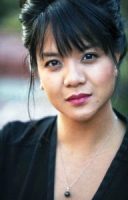
Living on the U.S.-Mexico line between Ciudad Juárez and El Paso, Sasha Pimentel and her University of Texas students have been touched by border violence, witnessed the drug wars and an epidemic of femicide. Her classes are never short of harrowing stories.
Envoi: Editor’s Notes
Helen Pinkerton (1927-2017)
As I am preparing this, news has arrived of the death on December 28 of Helen Pinkerton Trimpi at the age of 90. Helen Pinkerton was a poet of quiet renown. As her friend Turner Cassity was called a "poet's poet," Helen could rightly be labeled a "poet's poet's poet." Her verse was steely, consequential, and considered. Her blank-verse dramatic epistolary poems were masterful, and her devotional poetry and ekphrastic poems were models of their kind. And yet in the greater world of poetry, she drew scant attention.
Her history of publications extends at least back to the mid-fifties, which saw her published in journals alongside poets like Robert Pack and Ezra Pound. I was honored in 2002 to publish her first full-length collection, Taken in Faith. The first poem in that collection is "Coast Hillside." Here it is:
Cost Hillside
The Mondays must be lovely where you are.
All week and weekends crowds throng halls and gardens,
The rooms hung with the works of art you choose,
That you know best and love, though not your own
But theirs, who see or not see, as they can.
Now, in the quiet of their absence, you
Hearing the bronze peristyle fountain plash,
Will turn, perhaps, outside your office, glance
Down marble corridors, past fluted columns,
And see me standing where I last saw you,
Where we talked of the kouros' radiant poise.
Here, wild-oat fields unfold in planes of gold–
Of green-gold, white-gold, dun, drying to gray–
Down to the shore, where the Pacific, placid,
Misted and massive, shines with the same milk-blue
That you, if you should turn again and walk
Out to the sunlit balcony, might view.
Seeing the same sea, I, who love, see you.
(What's unsaid in the poem is that it is the practice of most art museums to be closed on Mondays; the curator to whom the poem is addressed is imagined as being alone with the works of art and the view from museum's balcony.)
Before I left my publishing position, I bought a case of Taken in Faith at my publisher's discount. I wanted a supply on hand to dole out to interested and worthy readers as I encountered them over the years. I still have a half-full box somewhere on the premises.
Thank you, Helen, for sharing your gifts with the rest of us. We were fortunate to have you in our midst.